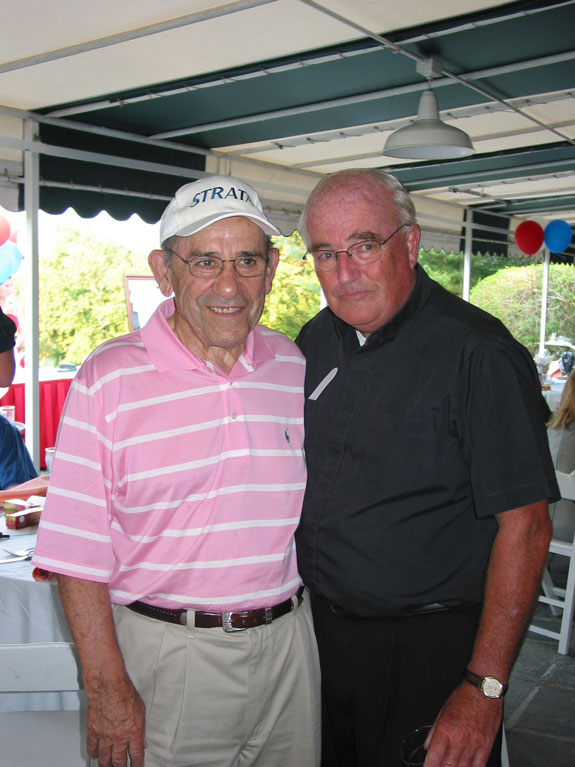By Frank DeRosa

BY THE TIME “Nobody Don’t Like Yogi,” Ben Gazzara’s one-man paean to Yogi Berra reached the New York stage in the Fall of 2003, I had already joined the ranks of the many who agreed with the sentiment in that play’s title. But ’twas not always thus.
How could a dyed-in-the-wool Brooklyn Dodger fan, who idolized the Boys of Summer of the late 1940s and well into the ’50s, in any way like the squat catcher in New York Yankee pinstripes, who just about every October – except for the Miracle Year of 1955 – wrecked our hopes and dreams for a World Series championship?
Time and again Yogi swung at bad pitches and smacked the baseball into all parts of the outfield or into the seats, assuring that Brooklyn fans would once again have to wait till next year. How could you like a guy like that?
Getting Personal
But as time went on, the more I learned – and mature I got – about Yogi the person, the more I read quotes by people about his likable manner and humble ways, the easier it became to join the legion of Yogi fans from a distance. And then, it got personal.
A couple of months before “Nobody Don’t Like Yogi” opened at the Off-Broadway Lamb’s Theatre, Yogi was one of the sports celebrities who came to The Tablet’s annual Bishops’ Golf Classic at North Hills Country Club in Manhassat, L.I., brought there by his pal, the former Dodger Joe Pignatano, another extremely likable onetime catcher.
Yogi came from his home in Montclair, N.J., even though a recent health issue would prevent him from playing golf that day. He had made a commitment and he was going to keep it. He did manage to pick up a putter and poke a ball on the putting green for a few minutes in the morning, but otherwise he sat at a table in the dining room for several hours chatting with whoever pulled up a chair, I among them.
Yogi was indeed likable, humble and easy to speak with. No pretense. He was happy to sign autographs. He bantered easily with Whitey Ford, his longtime friend and teammate, who also sat at the table.
When I had the chance to strike up a conversation with him, I was interested not in the player with Hall of Fame exploits, but in the son of Italian immigrants who settled in The Hill section of St. Louis, Miss., where one of his closest boyhood friends was another future major league catcher, Joe Garagiola. He said he and Joe played a lot of soccer, as well as baseball, together on The Hill.
He recalled growing up on The Hill, and he also talked about St. Ambrose Church in his neighborhood. You could see the obvious pride he had in his father, Pietro, a stonemason born in northern Italy who settled in St. Louis. He said the family patriarch used his manual skills to help do the stonework for the building of St. Ambrose Church way back in 1903. In fact, Yogi said with a smile expressing anticipation, he was planning to travel to St. Louis that December for the Mass commemorating the Church’s 100th anniversary.
Listening to Yogi, I thought of how Brooklyn Bishop Thomas V. Daily often told people in Brooklyn and Queens who came from elsewhere, “Don’t forget your roots.” Yogi apparently never did.
And like Gil Hodges, the beloved Dodger great who he replaced as Mets manager when Gil died suddenly in 1972, Yogi was faithful to his Mass obligations. It’s been said a few times that he was a regular at the 5:30 Mass in Immaculate Conception Church in Montclair, where his funeral Mass was celebrated this week. Yogi didn’t forget his religious roots either.
It’s so well-known that Yogi was a family man, lovingly married to his wife Carmen for some 60 years. Reflecting the other day on the words of wisdom about family life that Pope Francis shared with the faithful when he was in Philadelphia, who can doubt that the Holy Father, also the son of immigrants – and who also played soccer in his youth – would have liked Yogi.
There’s another aspect of Yogi’s life that stands out for me. As a 19-year-old Navy enlistee, he took part in the bloody D-Day invasion at Normandy on June 6, 1944. That fact means something to someone who grew up during The War. I have an unending admiration for all those who, like Yogi, experienced that brutal day, many of whom never came home. Yogi was more than a baseball player.
Without being judgmental about any of today’s baseball players, I’d recommend that youngsters now learning to love the game would do well to pick as a role model an old-time player named Lawrence Peter “Yogi” Berra.
Why? Because “Nobody Don’t Like Yogi.”
Frank DeRosa is the former public information director for the Brooklyn Diocese.
